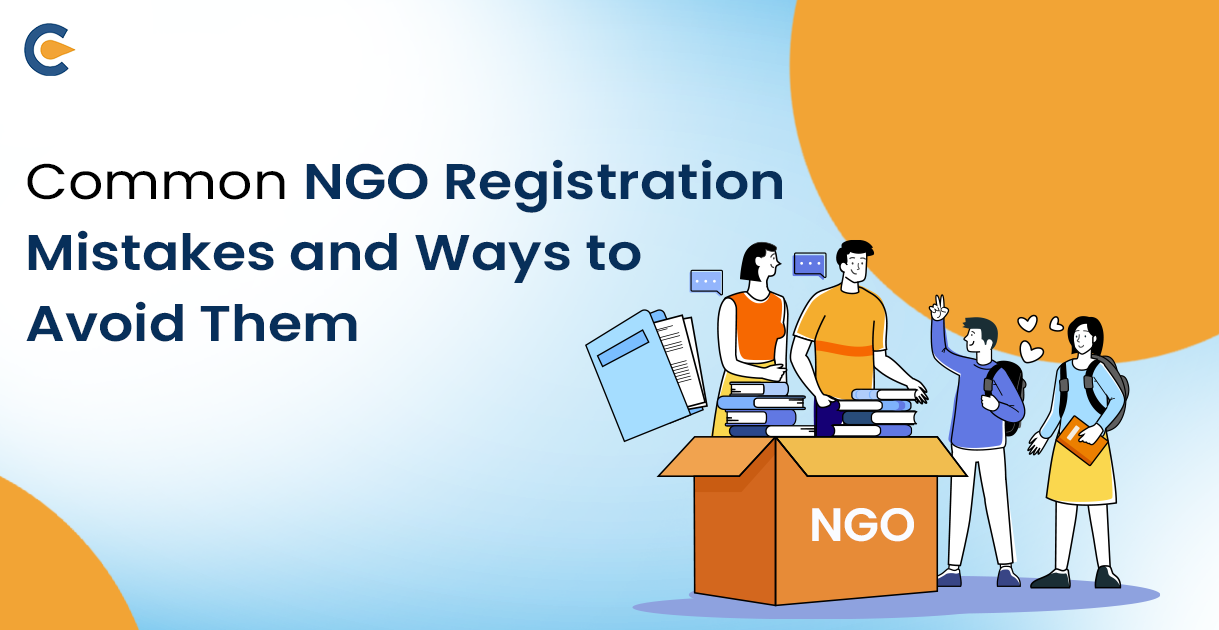Becoming a registered non-governmental organization (NGO) is a big step toward changing society in a real way. However, the procedure is frequently rife with difficulties and dangers that could cause the NGO registration mistakes in the process to drag out or fail. NGOs encounter a variety of challenges that call for cautious navigation, from intricate legal requirements to bureaucratic roadblocks. Irregular mission statements, poor recordkeeping, and non-compliance with regulations are common Pitfalls in NGO Registration. Complicating matters further is figuring out the nuances of fundraising laws and tax exemption status. In this examination of typical Common NGO registration mistakes, we should explore important issues and provide practical advice to assist groups steer clear of mistakes. Through comprehension and proactive resolution of these common NGO registration mistakes, non-governmental organizations can optimize the enrollment procedure, lay a solid basis, and concentrate on accomplishing their motto of making a positive change in society.
Common NGO Registration Mistakes
The common NGO registration mistakes that hamper the growth or registration process of NGOs are –
Insufficient Research
It is one of the most common problems that the applicants face after the registration is done. If the research in the related field is not done, then the motto of the NGO would be very difficult to meet, and there would be no activity in the organization, thereby leading to its closure. This happens in cases where the applicant shows urgency in registration, which causes the downfall of the entity. If the applicant wants to open an NGO to pet stray animals and he didn’t do any research on the existing NGOs serving the same sector, then there will be so much competition, and the applicant won’t be able to make progress or faster progress since the already existing and serving NGO will attract more donors.
To avoid such an issue, the applicant needs to thoroughly study the area of work and look for potential competitors. Then, according to the competitors, the applicant should make such changes or inclusions in its organization that make it distinct from the others and help the cause in a better and more effective way.
Legal Incompliance
To open an NGO, entrepreneurs often make Common NGO registration mistakes while registering it. They miss certain approvals and licenses that are necessary to commence the organization’s proceedings. Legal compliance is very necessary to oblige, else there can be strict penalties involved in non-compliance, or even the organization can be led to its closure.
NGO Registration mistakes can be lessened if the entrepreneur looks into the necessary legal compliance in the process. It is an important step; hence, the applicant can even get help from the legal experts that can be provided by Corpbiz. Legal counsel will ensure that each compliance is met and do the necessary paperwork and licensing required.
Aimless Objectives
If the operations of the NGO are aimless and driven to several sectors, then it will be very hard for it to survive in society. The aims and objectives of the organization should be very specific, and even if you want to diversify, then you should initially grow and establish the organization in society.
To avoid NGO Registration mistakes, one should be clear about the role that the organization will be playing in society. Diverse goals in the initial phase would lead to the breakdown of the organization and its closure, with so much money being wasted.
Inadequate Finance Management
Entrepreneurs often make inadequate financial plans, which is one of the common pitfalls in NGO registration. The entrepreneur should be clear about the idea and objective to be certain where and how much he has to invest in a particular field. Without proper financial planning, any project can be shattered into pieces, and that is why most NGOs fail to survive for a longer period than expected.
The entrepreneurs should look into the project and do the proper financial planning required for operations and management in every sector. If the funds are not enough to complete the objective, appropriate measures of funding should be looked at. Common NGO registration mistakes often include scarcity of funds in the hands of management.
Poor recordkeeping
It is also one of the common NGO Registration mistakes that an entrepreneur makes. Maintaining the books of accounts and other transactions is very necessary for the better functioning of the organization. With all the records and spending history, it is easy for the organization to prepare the budget to allocate to different sectors to accomplish the objective.
To avoid this, the books of accounts and other records should be maintained properly, and there should not be any interference from outside persons who can misinterpret the transactions. With proper bookkeeping, the organization can maintain its expenses and plan its finances accordingly.
Correct Organizational Structure
Entrepreneurs often make NGO Registration mistakes while choosing the structure of their organization. If they choose the incorrect structure, then there will always be a discrepancy in performing the task and maintaining the objectives of the organization. There would be legal complications as well if the wrong organizational structure is opted by them; hence, it should be given proper thought before the registration.
While registering for the NGO, there should be proper research about which organization would be best suited to serve the purpose. Entrepreneurs can register their organizations as a Society, Trust, or Section 8 company as per the applicable laws, and this is why they should give proper thought to their registration. One should be clear about the objective of the organization and the pros and cons of registering in different types of organizational structures. The one that serves the purpose in the best possible way should be chosen, and the legal compliance and paperwork should be done according to the regulations set under the said act.
Improper communication
The other common NGO Registration mistakes would include a lack of communication within the organization. There should be proper communication between each member of the organization for optimum results in reaching the firm’s objectives. The local members can give better insights that would help the organization plan in a way that would cater to the issues.
To avoid this, regular meet ups should be done with the stakeholders, management, workers, community members, etc. This would increase communication and ease the work and its management. Feedback and suggestions should be taken from everyone to take a step towards improving the process.
Insufficient Market Capturing
In this era, market capturing is very important for any business or even an NGO, and these NGO Registration mistakes are made quite often. However, the NGOs mostly follow the same old process of market capturing, and they are not into new methods of doing publicity. This is the modern age of digital media and these NGOs should as well promote digital platforms. Although some of them have started applying these tactics, there is still an abundant number of NGOs that are not promoting themselves through digital platforms.
The new entrepreneur should promote the organization through these means, and apart from social media, they can organize camps or an online campaign where they can enlighten the general public about their objective and what their measures to achieve them will be. This can help them grow and attract some investors.
Tax non-compliance
NGO Registration mistakes include non-compliance with taxation in the country. Most people think that just registering an NGO would imply that they are exempted from taxation by the government. To get the exemption from taxation, the NGO has to get the NGO Darpan registration done along with section 12A and 80G registrations of the Income Tax Act 1961. Without these registrations, these organizations have to comply with regular tax structures.
To avoid these Common Pitfalls in NGO Registration, one should do the required documentation along with legal compliance to face no problems in the future. Tax compliance should be met since non-compliance can lead to the cancellation of the entity’s registration.
These are the common NGO Registration mistakes that are made and can be avoided with very little effort and awareness. One should be well versed in the process, and the rest of the things are manageable. If the applicant finds it difficult to manage, then he can take the help of the legal counsel, who can guide them through the process and complete all the documentation needed.
Conclusion
The NGO registration is a very important step for the commission of noble activities towards the society. Many NGO registration mistakes are made by entrepreneurs to register it and function properly in society. It requires proper planning, research, financial planning, and compliance to establish an NGO in the country, and if any of the tasks are not performed in the manner they are to be performed, then there can be various negative impacts that can be there against the organization. To avoid these common NGO Registration mistakes, one needs to be a little proactive, look into the compliance part, and seek an expert’s guidance if there are any issues or doubts in one’s mind.
Corpbiz can help these entrepreneurs establish the organization by helping them follow compliance and also choosing the correct organizational structure to meet the objectives of the organization in a shorter time frame. We have a talented pool of legal experts who can help you set up the NGO in the best possible way and in a manner that is not troublesome for you.
Frequently Asked Questions
What happens in a case of non-compliance of law for an NGO?
If an NGO does not comply with the law of the land while or even after its registration, then there can be hefty penalties levied on that organization as well as on its senior management. Apart from monetary penalties, there can even be a cancellation of registration if such non-compliance is serious.
Why should NGO Registration mistakes be avoided?
NGO Registration mistakes should be avoided so that there is assurance about its smooth and successful operation in society. It helps them avoid any legal complications and achieve their mission as soon as possible so that they can expand and serve the purpose of their registration to the bigger group of society.
What are the basic necessary documents required for NGO registration?
The documents needed for registration by a firm include the Trust deed, Articles of Association, and the Memorandum of Association. Without these documents, it is impossible to register an NGO in the country, and without registration, they won't be able to claim the Tax benefits as per the Income Tax Act of 1961.
What is the main problem faced by the NGOs?
However, it cannot be said with certainty that NGOs nowadays are mostly facing problems related to the appropriate fund management. Their finances are not being managed properly, and that is a cause for concern since financial planning is a very important step to functioning properly as an NGO.
What are the laws under which an NGO can be registered?
According to Section 80G of the Income Tax Act, donors to designated relief funds or non-governmental organizations may claim a deduction from their taxable income. Nevertheless, not all donations are protected by the statute. Donations to non-profit organizations may be deducted, but only certain funds that are designated by the government may be deducted.
Can an NGO run without registration?
Yes, an NGO can run without any registration, but this is the common type of NGO Registration mistake that people make. By not registering the NGO, you are denying your NGO access to various governmental policies, benefits, and funds. Apart from these benefits, registered NGOs and donors get exemptions from tax as per section 12A and 80G of the Income Tax Act 1961.
What are the common pitfalls in NGO registration?
Irregular mission statements, poor recordkeeping, mismanagement of funds, conversation gaps between members, and non-compliance with regulations are common Pitfalls in NGO Registration.
Why is NGO Darpan registration required?
NGO Darpan registration is required by these organizations because after getting the Darpan registration, these NGOs can claim tax benefits as per sections 12A and 80G of the Income Tax Act 1961, and along with this, they get the FCRA registration done easily without much trouble.
Can an NGO be registered by one Person?
No, an NGO cannot be registered by only one person since the minimum number of members required to register an NGO is 5.
Read Our Article: Look at the Forms of NGO Registration











